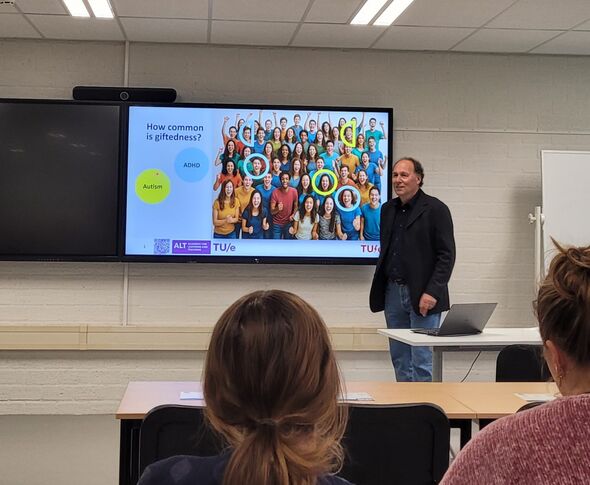Gifted but frustrated: education that doesn’t fit
Gifted students learn and think differently, which can sometimes make it difficult for them to perform as the education system expects. During an event organized by the Academy for Learning and Teaching (ALT), Professor of Electrical Engineering Guus Pemen emphasized that it is crucial for teachers and supervisors to recognize this and take their unique needs into account.
“You’re just smart, right?” Under this provocative title, ALT hosted an interactive session on Tuesday afternoon about the challenges faced by gifted students. The session aimed to raise awareness about what characterizes this group and what they need to thrive in higher education.
Pemen started with an explanation of giftedness. He asked the audience how many out of a hundred people they think have ADHD, and how many have an autism spectrum disorder. As expected, the final question was about the number of gifted students. Although the percentages are comparable (between 1.5 and 2.5 percent), there is still hardly any attention paid to giftedness in education, unlike autism or ADHD.
“Even though it is a significant group,” Pemen emphasizes. At TU/e, the numbers can reach 10 to 15 percent of students. Giftedness, like autism and ADHD, falls under the umbrella of neurodivergence—a collective term for people whose brains function differently from the “neurotypical” average, which can affect how they learn, think, and develop.
Intelligent, creative, and eager to learn
Pemen explains that giftedness is related to high intelligence, but the two are not exactly the same. “Being gifted generally means having an IQ above 130. Above 145, we speak of exceptionally gifted individuals.”
High intelligence is not the only characteristic. Other criteria include an exceptional eagerness to learn—especially in subjects they are interested in—and a high degree of creativity. “They are highly autonomous, curious, quick learners, and they think outside the box,” he emphasizes.
The downside
Giftedness also has a downside, often because the education system is poorly tailored to their specific learning needs. Gifted students often learn top-down: they need to see the bigger picture before focusing on details. They also have a strong need to understand things thoroughly and struggle with rote memorization without grasping underlying connections.
The lack of knowledge about giftedness in education often causes these students to underperform and prevents them from fully realizing their potential. They can easily become frustrated, skip classes, receive poor grades, and sometimes even drop out. “There are no hard statistics, but I estimate that one-third of gifted students drop out,” says Pemen. “Not because they cannot learn, but because they learn differently. One of my students in Electrical Engineering struggles with the bachelor’s program, even though he is actually ready for a PhD. In principle, he could even skip the master’s program.”
How can the situation for these students be improved? According to Pemen, the first important step is to identify them early. After that, the approach must be tailored to their specific needs. Academic advisors and examination boards play a crucial role. “They need the knowledge to properly support this group,” he emphasizes.
Stereotypes and misconceptions
Next, Jesse van Meer and Mara Gianotten, founders of the Donatues Foundation for neurodivergent and gifted individuals, took the floor. They began by debunking several stereotypes and misconceptions. “Being gifted doesn’t mean you know everything or are always smart. It involves much more than that,” Van Meer explains.
He also highlighted the high dropout rates and the fact that these students often end up in educational tracks below their level. “If they can’t manage the pre-university track, they are sometimes sent to lower-level secondary education, which only further demotivates them and can eventually place them in vocational education,” he says. “With a different approach, they could have successfully completed pre-university education.” Even when they obtain their diploma, they sometimes hesitate to enroll in a university program. “They are often already traumatized by their secondary school experience and don’t understand why university would be any different.”
Knowledge vs. expectation
One of the biggest obstacles for gifted students is exams. No matter how much knowledge they have, they often cannot provide answers in the way the exam requires. To make the experience of gifted students tangible, Van Meer and Gianotten presented several typical exam questions.
The first was a multiple-choice question with options a, b, c, and d, where d was “all of the above.” Gianotten explained that this often causes confusion for gifted students, especially when instructions indicate that only one answer is correct. “Technically, all answers are correct. They might randomly choose answers, debate with the teacher, or get completely stuck. It wastes unnecessary time and energy.”
“But everyone understands what the teacher means, right?” someone from the audience asks. Gianotten responds: “That’s exactly the problem. It’s not just about knowledge, but about understanding the teacher’s expectations. Neurodivergent students can struggle with this, even if their knowledge exceeds the average.”
Even when students learn to navigate this, the question remains: are we testing their knowledge, or only their ability to do what is expected of them?
Support
Van Meer closed the session with a call to teachers: “Listen to your students and be open to new perspectives.” Teachers have many students to manage, and it is unrealistic to have a ready-made solution for every situation—he is fully aware of that. “That’s why we founded Donatues. We are here for anyone who has questions about neurodivergence. Don’t hesitate to ask for help.”
According to Van Meer, it starts with an open mind and attention to these issues. “If there is a will, there is a way,” he concludes.
Do you have questions about neurodivergence? Contact the Donatues Foundation at contact@donatues.com or visit www.donatues.com for more information.
This article was translated using AI-assisted tools and reviewed by an editor.



Discussion